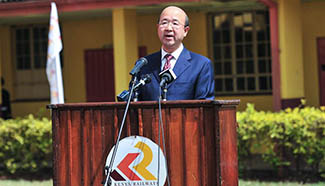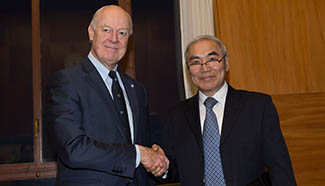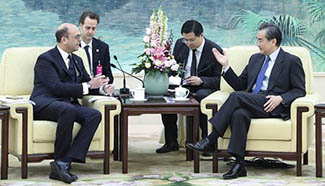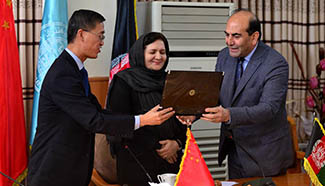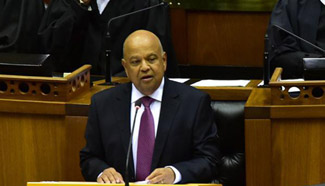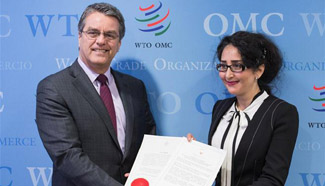Staff members of Sichuan Entry-Exit Inspection and Quarantine Bureau check the condition of giant panda Bao Bao at Chengdu Shuangliu International Airport in Chengdu, capital of southwest China's Sichuan Province, Feb. 22, 2017. A charter flight carrying Bao Bao, a giant panda born in the United States, landed in Chengdu, after a 16 and a half hour flight. (Xinhua/Liu Kun)
NEW YORK, Feb. 23 (Xinhua) -- Born and raised in the United States, Bao Bao, a 3-year-old giant panda, fails to become a U.S. citizen and has arrived in China on Wednesday.
Unlike the U.S. citizenship policy for people, which stipulates that one becomes a U.S. citizen if he/she is born on the U.S. territory, the citizenship of giant pandas observes another policy.
In fact, most giant pandas around the world are on loan from China, and cubs born abroad have to be sent to the Chinese breeding program to expand the gene pool before they turn four.
As a result of artificial insemination, Bao Bao was born on Aug. 23, 2013, at the National Zoo in Washington D.C.. It is time that Bao Bao come back to China.
Unique to China and adored around the world, giant pandas have played an important role in China's diplomacy, or "Panda Diplomacy" as some experts call it.
Before 1982, giant pandas were given away to other countries by the Chinese government as a token of friendship and goodwill.
In 1941, a pair of giant pandas were given to the United States by Soong May-ling. They were the first batch of pandas given away as gifts.
After the foundation of the People's Republic of China in 1949, more giant pandas were shipped abroad.
Two giant pandas were sent to the former Soviet Union by the Chinese government in 1957 and 1959 respectively.
In 1972, two giant pandas named Ling Ling and Hsing Hsing were given to the United States as gifts after U.S. President Richard Nixon' s visit to China.
From 1965 to 1980, five giant pandas were given to the Democratic People's Republic of Korea.
By 1982, 23 giant pandas were shipped abroad. Most of them have died.
However, the "give-away" policy was put to an end in 1982 because of the decreasing number of the endangered bear. Instead, the "on-loan" policy started.
From 1984 to 1988, zoos in Los Angeles, San Francisco, New York and several other cities of the United States managed to rent giant pandas from China.
Zoos in Japan, Britain, France, Germany and other countries also managed to borrow pandas.
The rent money, which ranges from tens of thousands to millions of U.S. dollars, was used to fund the conservation and breeding programs of the endangered species.
Funds from the rent combined with the Chinese government's subsidy and other conservation efforts have paid off.
Including cubs, the current population count is approaching 2,060 and mature adults are estimated to constitute 50.5 percent of the total population, according to a report by the International Union for Conservation of Nature (IUCN) in 2016.
In the Red List of Threatened Species on Sept. 4, 2016, which assesses a species' conservation status, the IUCN reported the giant panda population has improved enough for the endangered species label to be downgraded to "vulnerable."
However, the threat of declining bamboo availability due to climate change could, in the near future, reverse the gains made during the last two decades, the IUCN warned.
Related:
Video: Panda Bao Bao returns to Chengdu in SW China
China welcomes U.S.-born panda home
CHENGDU, Feb. 22 (Xinhua) -- After a 16-hour flight, American-born panda celebrity Bao Bao arrived home in southwest China Wednesday night, apparently looking well.
The FedEx Boeing 777 Freighter, painted with picture of a giant bamboo-eating panda, landed at Chengdu Shuangliu International Airport in Sichuan Province at 7:10 p.m. local time.Full Story




